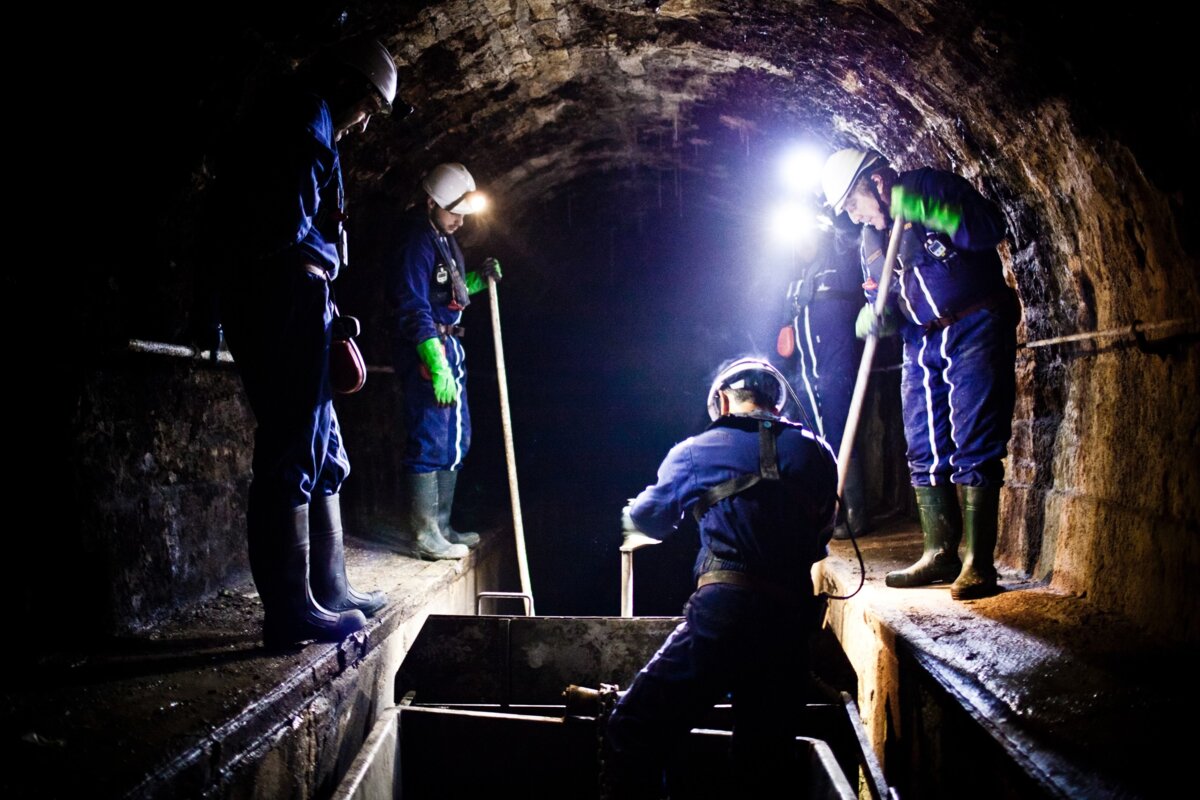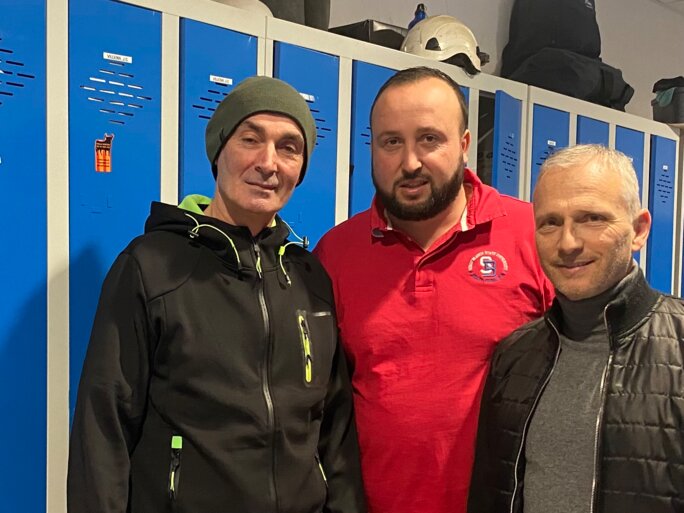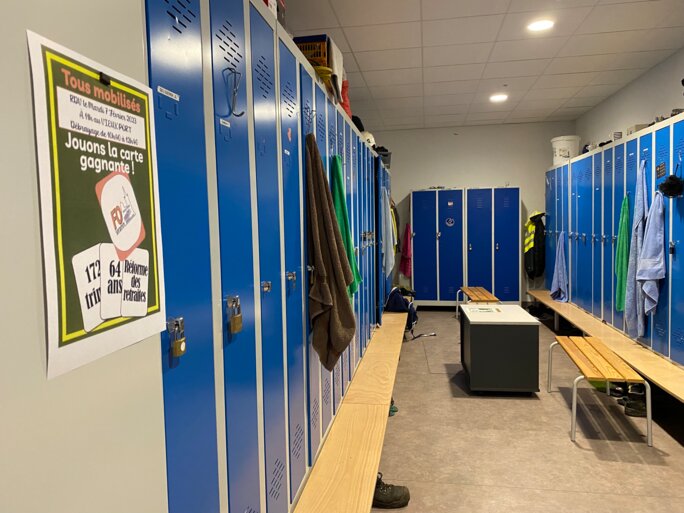France has some 800 sewer workers who walk miles underground every day in cramped surroundings, in the dark, and sometimes breathing in toxic fumes. Paris has just under 300 such workers, the city of Marseille in the south around one hundred. Yves Biagioni is one of them.
Now aged 50, he has worked in a treatment plant in Marseille since he was 21. His father also worked for SERAMM, the sanitation firm Service d’Assainissement de Marseille-Métropole: he died of cancer at 60, a few months after retiring. “So I make the most of life. I go on holiday when I can, I spend time with the family, because I don't know if I'm going to last until retirement,” explains Yves with an awkward smile.
The sewage workers in Marseille all work for SERAMM, a subsidiary of the huge water and waste company Suez. This means they are private sector employers and are enrolled in the standard pension and retirement scheme for workers. Like most other workers they can retire at the age of 62 (which is not the case with many manual workers in the public sector who belong to different schemes and who can retire earlier). If President Emmanuel Macron's bitterly-contested planned pension reforms are implemented that will rise to the age of 64.
“The onerous nature of our work isn't officially recognised,” says Jean-Christophe Nadal, a building worker in the sewers and an official for the Force Ouvrière trade union at SERAMM. Only those staff who work shifts in the sewers are officially classified as working in hardship conditions, meaning they can qualify for earlier retirement. “But there are very few of them, all the rest leave at 62,” Jean-Christophe Nadal explains.

Enlargement : Illustration 1

The sewer workers in Marseille look on enviously at the special retirement regime enjoyed by counterparts in Paris who can down tools at the age of 52 – though this will rise to 54 if the reforms pass. “And 52 is already quite high, given the hard nature of their work,” says Benoît Martin, secretary general of the CGT trade union's Paris branch. “The sewer workers are very much on our side against this pension reform.”
Ten years longer at work in Marseille
The Paris sewer staff able to retire at 52 on a full pension are those who have worked twelve years underground, six of them consecutively, and who have contributed to their pensions for at least 32 years. That is ten years fewer than their counterparts in Marseille, who have to clock up 42 years of contributions to get a full pension. “We want the Parisians to keep their [special pension] regime because you can't work in the sewers after the age of 52, and what we really want is to have the same as them,” say the Marseille sewer workers to whom Mediapart spoke.
“In fact, while the government wants to abolish special [pension] regimes, we want to add one so that all the sewer workers have the same rights,” notes Jean-Christophe Nadal.
The difference in the way staff in Marseille and Paris are treated is due to the fact that the Mediterranean city council has delegated its sewer service to a private company, SERAMM, while in the capital it is the city's council which employs the workers. The Marseille sewer workers are thus in the private sector and subject to the standard, general pension regime, whereas the Parisian staff are classified as local government workers. “And the local government staff pension fund officially recognises the hardship of working as a sewer worker, whereas the general pension fund doesn't,” explains Jean-Christophe.
Already, at the age of 50, Yves Biagioni's joints are creaky and he has a sore back and knees. “For the time being it's okay and even when it's bad you carry on going in because we're attached to our company and to the service we provide to the people of Marseille, but there are days when it's tough,” he says.
He describes his typical working day from 7am to 2pm in an underground purification plant. “I arrive and I cover myself up,” he says. This means donning his overalls, his helmet, his mask and his boots. “If I have to go down a lot I put on other protection too.” Then he descends to those underground sites where maintenance is needed. “My job is to verify and repair the equipment for measuring the level of water, of the temperature … breakdown work, basically,” he adds.

Enlargement : Illustration 2

Yves accepts that he does not bend down and crouch as much as his colleagues who inspect and clean the tunnels themselves, but the surroundings are the same: the darkness - a lamp on the helmet being the only source of light - the noise that stays in your ears a long time after you resurface, the awful smells, and having rats and bugs as your companions. “It's wretched in there,” adds colleague Mario Murzilli, who inspects and cleans the tunnels. “You find cockroaches on you, it's crap.” And then there are the dangerous emissions.
Potentially fatal gas
Like their colleagues, Yves and Mario are equipped with a detector to monitor the levels of hydrogen sulphide (H2S). As soon as the alarm goes off they have to resurface to get some air. In fact, at certain levels of concentration inhaling this gas that comes from the decomposition of organic materials can be fatal. “And it goes off often, especially in the summer,” says Jean-Christophe.
“It's not just that,” the trade union official points out. “You find everything in the sewers. Petrol that people pour away after repairing their car, chemical products, mixed domestic products, oil, building waste. People chuck out everything.”
In 2006 and 2009 Pascal Wild, a researcher at the institute for the prevention of workplace accidents and illness, the Institut national de recherche et de sécurité pour la prévention des accidents du travail et des maladies professionnelles (INRS), published studies on the mortality rate of sewer workers. The results could hardly have been clearer.
Between 1970 and 1999 sewer staff working in Paris had a death rate that was 56% greater than the population of the département or county of Saint-Seine-Denis, a largely deprived area to the immediate north and north-east of Paris. That rate rises to 97% if one just looks at people aged up to 65. “It's enormous,” clinical pathologist Claude Danglot, who used to work for the preventive medicine service at City Hall in Paris, told Libération in 2020. “And yet they're told that they should be under a universal retirement system,” he said. “As a doctor it's a subject close to my heart. From my own experience I know several sewer workers who died before they reached retirement.”

Enlargement : Illustration 3

Jean-Christophe Nadal also has plenty of examples of colleagues who died just after retiring, and in some cases before. “I'd really like there to be more scientific research - and more recent research - about excess deaths in our job, on the products to which we are exposed, on workplace illnesses … because we really feel these illnesses are linked to our work but it's hard to prove,” he says.
He insists that his employers do their best to ensure the sewer staff are safe. “Though they have really done all they can, it's the work itself which is onerous, and you can't do it after a certain age,” Jean-Christophe adds. His two colleagues signal their agreement.
Before working for SERAMM, Jean-Christophe was in the building trade “which is already one of the hardest trades, but doing this job in the sewers, it's ten times harder. There's no comparison,” he says. He does surface repair work and also down in the sewers themselves too. It is the latter which wears out the workers the most.
The union representative mimes with his arms the struggle of having to crawl along dark tunnels 1.2 metres high, while pulling behind you buckets of concrete each weighing five kilos for several dozen yards, and at the same time having to carry your tools. “Who can do that at 60, 62 or 64?” he asks. “At SERAMM, more than a hundred people go down below ground every day and they can't work until they're 64.”
Despite these hellish working conditions, every day there are workers aged over 55 in the changing rooms, putting on their overalls, mask and other protective equipment, before plunging down into the darkness. Even if they have bad backs and worn-out lungs, they cannot afford to give up work before the legal age of retirement. For they know that if they retire early, before they have made their full pension contributions, the resulting smaller pension will guarantee financial insecurity for them in the future.
And we can't even save for retirement ourselves. Because with our wages, and given the rise in the cost of everything, it's impossible to put a little money by.
The net wages of sewer staff at SERAMM range from 1,500 euros to 2,000 euros a month for those with most years of service. Under the general pension regime their basic pensions are on average around 1,000 euros a month.
“Fortunately we have our supplementary [pension] contributions, which adds 600 to 700 euros for us,” explains Jean-Christophe Nadal. “In fact, we have to build up capital for our retirements, in particular with Percos [editor's note, collective retirement savings plans]. We have to do that because our basic pension is ridiculous.”
“And we can't even save for retirement ourselves,” adds Mario Murzilli. “Because with our wages, and given the rise in the cost of everything, it's impossible to put a little money by.”

Enlargement : Illustration 4

To obtain a full pension, Mario will have to work until he is 67. He joined SERAMM in 1997 at the age of 29 as a sewer worker cleaning and repairing the tunnels. Before that he did some “manual odd jobs” but to his regret many of his employers at the time did not declare him on their books, meaning he did not accrue any pension rights. Of the three SERAMM workers featured here, Mario is perhaps the one who has the toughest working conditions of all. The morning Mediapart met him, he was in a sewer so low that he had to work on his knees for more than 30 minutes.
“Technology and safety have progressed,” concedes Mario. “But in reality, for me the job has not changed in 25 years. You're in the sewers, using your spade to fill buckets with sand which is at the bottom and it's taken up in a container. It's dredging.” These are the daily tools and materials with which he works: container, bucket, shovel and the sand that collects in the sewers. “That's how you dredge the bottom of the sewers and that doesn't change,” he says.
The three SERAMM employees featured here have all gone on strike over the pension reforms when called on to do so by the trade unions. They will be demonstrating again this Saturday in the streets of Marseille and will down tools “each time we have to”. But they now think it is time to step up the protest movement. “We wanted to discuss with them, they don't want to and they want to keep their reform. We demonstrate but, well, what we're doing on strike days is going for a walk more than anything else, we're walking,” shrugs Jean-Christrophe Nadal.
Yves, Mario and Jean-Christophe reveal what their next step would be. “At the risk of losing our jobs, it's better to do it in one go and blockade the country for real,” says Yves. They would prefer a hard multi-sector strike which lasts long enough to shut down the city's and the country's economy. While waiting for their union to call rolling strikes, they will continue to follow the current one-off days of action. Yet at the same time they worry that the numbers of those taking part will dwindle each time.
--------------------------------------------------------------------------
- The original French version of this article can be found here.
English version by Michael Streeter


